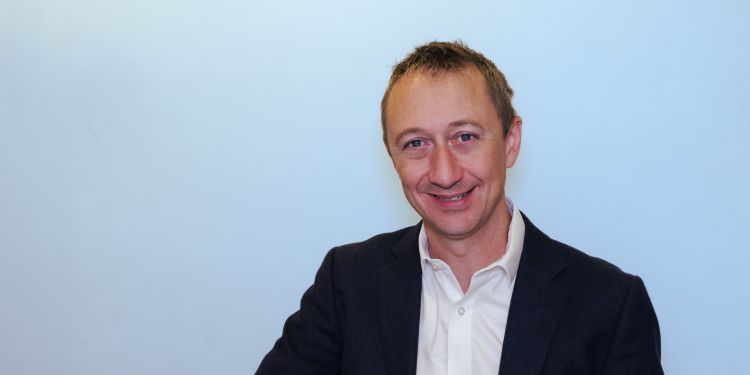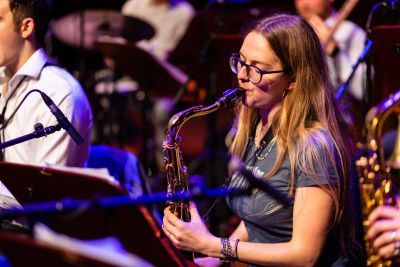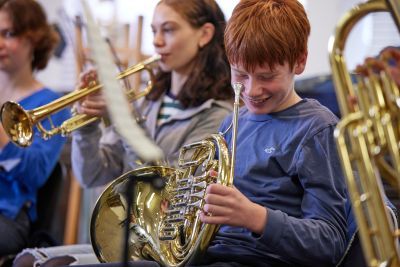
We caught up with alumnus Evan Dawson (Jazz 2001) on his career journey from Guildhall graduate to CEO of National Youth Arts Wales.
Saxophonist and composer Evan Dawson completed a Postgraduate Diploma in Jazz and Studio Music at Guildhall School in 2001. He then did an MA in Arts Management, specialising in research about the mental and physical health impacts of arts participation. His career has since included being CEO of both Live Music Now and the Royal Photographic Society. Since October 2023 he has been CEO of National Youth Arts Wales, which is responsible for all of Wales’ national youth ensembles including its orchestra, choir, brass band, theatre and dance ensembles.
Why did you choose to study at Guildhall School?
Back then, all my jazz heroes were teaching at Guildhall, including Stan Sulzmann, Tim Garland, Pete Churchill and Simon Purcell. It had to be Guildhall - there was no contest!

How would you describe the atmosphere and culture at Guildhall School during your time there? What did it feel like to walk into the building?
The atmosphere in the building was overwhelming. It was so uplifting to be amongst such creative, thoughtful and optimistic students and tutors, from a wide variety of artistic disciplines. I relished every moment.
Are there specific memories or experiences at Guildhall School that had a lasting impact on you? And how did the School prepare you for your career?
I remember some extraordinary concerts that combined Guildhall Jazz Orchestra with its singers and string players, but it was actually something else that had the most lasting impact on me. Whilst I was at Guildhall (and afterwards), I volunteered once a week for a music project on a housing estate in South London, led by the conductor Bill Carslake. Seeing the profound and joyful impact on those young people, their families and the wider community has shaped my career since then in many ways. Guildhall encouraged me to do this, and provided practical support for some of the music workshops I led with the young people.
What is a typical day in the life like for you?
Some days I might be sitting on audition panels for our music, theatre and dance ensembles around Wales; or talking with ministers about the impact of the arts on society; or writing finance reports and fundraising proposals with my staff and trustee teams; or discussing repertoire with concert producers. But I know it’s also important to be creative myself, and spend time with my family. My 13-year-old son loves wildlife and nature, and is also an aspiring jazz pianist, so we have a lot of fun.
What has been your career highlight since leaving Guildhall School?
Whilst I was working at Live Music Now, we led a project called “A Choir in Every Care Home”. We worked with care homes, academics, politicians and hundreds of musicians throughout the UK to explore how music could support people who live and work in care homes. Launched at the House of Lords and Welsh Senedd, we published a series of evidence reviews and practice guides, which have directly influenced the importance that the Care Quality Commission, Care England and others now place on music and arts projects, particularly for people living with dementia. I’m really proud of that work.
What are your hopes for the future?

With arts funding cuts throughout the UK, I’m worried that many young people won’t get involved in music and the arts, and instead spend more time at home immersed in computer games, social media and Netflix. Through my work at National Youth Arts Wales, I’m determined that we will find new ways to inspire, support and connect young people who all instinctively need to be creative and sociable. With mental health diagnoses for teenagers spiralling, now is the time to invest more in the arts, not less!
What piece of advice would you give to our students/recent graduates who are starting out in your profession?
Music, dance and drama students sometimes think “success” means being able to spend your life performing – and it would be a “failure” if your career involves teaching, workshop leading or community work. But actually it’s those things that make you relevant and socially connected as an artist, raising your work to the highest level. Learning to really engage people in your art and to listen honestly are as important as any technical skill, and it will make you happier!
Find out more about Evan's work at www.nyaw.org.uk